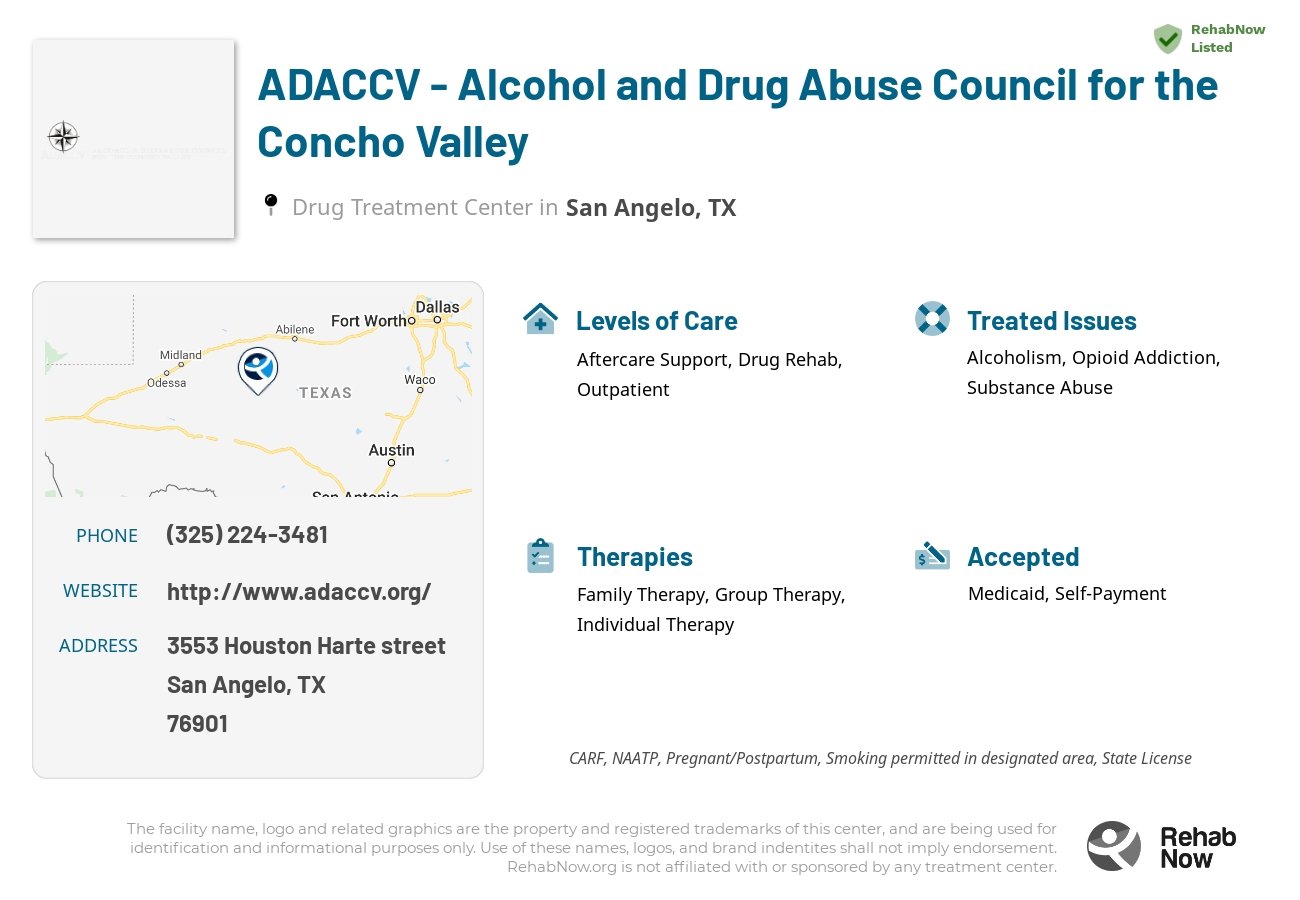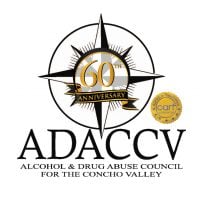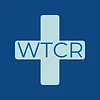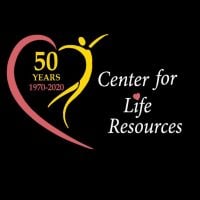ADACCV - Alcohol and Drug Abuse Council for the Concho Valley
Drug Rehab Center in San Angelo, Texas
ADACCV is a CARF-accredited addiction treatment facility in San Angelo, TX that offers comprehensive levels of care to help those suffering from alcoholism, opioid addiction, substance abuse, dual diagnosis, and drug addiction, including aftercare support, drug rehab, outpatient, and detox services for which private health insurance may be accepted.
About ADACCV - Alcohol and Drug Abuse Council for the Concho Valley in Texas
ADACCV Alcohol and Drug Abuse Council for the Concho Valley, situated in the heart of San Angelo, Texas, is a beacon of hope for adults seeking to overcome the grasp of alcohol and drug dependency. This facility uniquely offers a comprehensive suite of services, including residential treatment, detox, sober living, and outpatient programs, tailored to meet the diverse needs of its clients. With a special focus on creating a supportive, gender-specific environment and accommodating mothers with young children, ADACCV stands out as a nurturing space for recovery.
- Provides a 72-bed detox facility with gender-specific residential treatment, catering uniquely to both men’s and women’s needs during recovery.
- Sober living homes offer a structured environment for up to 14 individuals, requiring engagement in outpatient programs while promoting abstinence.
- The outpatient program is designed to fit around daily work schedules, featuring a 12-week plan that includes individual, group, and family therapy.
Accredited by the Commission on Accreditation of Rehabilitation Facilities (CARF), ADACCV ensures a high standard of care and professionalism in tackling addiction. Their wide range of insurance acceptance, including most plans, facilitates easier access to their services, emphasizing their commitment to the mission of saving lives and nurturing healthier communities.
Specializing in the treatment of alcoholism, opioid addiction, dual diagnosis, and drug addiction, ADACCV employs a blend of individual therapy, group sessions, and evidence-based interventions. These methods, combined with their varied levels of care from detoxification to sober living, pave multiple pathways toward a sustainable recovery.
Genders
Ages
Modality
Additional
Accreditations

CARF
The Commission on Accreditation of Rehabilitation Facilities (CARF) is a non-profit organization that specifically accredits rehab organizations. Founded in 1966, CARF's, mission is to help service providers like rehab facilities maintain high standards of care.
Conditions and Issues Treated
Substance abuse is defined by the continued use of drugs or alcohol despite negative consequences, such as legal or work problems. It can be treated using a variety of services, including therapy and medication.
Substance abuse treatment is beneficial for:
- People who have been using drugs or alcohol for a long time.
- People who have been using drugs or alcohol to cope with stress, anxiety, or depression.
- People who have a mental health disorder in conjunction with substance abuse.
- People who continue to use drugs or alcohol despite the harmful effects they cause on their own life and the lives of others.
- People who have had multiple failed attempts at recovery without medical assistance.
If you believe that addiction treatment is right for you or a loved one, you can contact your primary care physician, or search for addiction treatment centers in your area. Treatment is beneficial to people who are motivated towards recovery, and who understand the benefits of professional care.
Opioid addiction is a common form of addiction, often caused by prescription drugs that are abused. Addiction is treated by detoxifying the body and following up with therapies to correct behavior and target the root of the problem.
Most opioid addiction begins with patients being prescribed painkillers after an injury or surgery. The body becomes used to the chemicals in these medications and soon no longer responds to their presence. As a result, addicts seek out stronger opiate-based medications like Oxycodone to compensate for the lack of effectiveness.
The most dangerous aspect is that these addictive behaviors often get carried over onto illicit drugs like heroin, which are increasingly potent and result in lower life expectancies.
Levels of Care Offered
This center offers a variety of custom treatment tailored to individual recovery. Currently available are Aftercare Support, Detox, Drug Rehab, Outpatient, with additional therapies available as listed below.
Detox is the body’s process of removing toxins. In substance abuse, detox refers to the process of getting rid of drugs already present in the system once the patient stops further intake. Detox is the initial recovery step. Physiological drug dependence over time can lead to symptoms of withdrawal. Depending on the symptom severity, the detox process is managed either medically or clinically. While medically assisted detox relies on specific medicines, clinical or social detox relies on providing the patient with emotional and psychological support.
Outpatient treatment programs are less intensive than an inpatient program. Participants live at home while working or going to school. Benefits include being able to continue relationships with family, friends, and work/studies. Treatment includes educating patient on addiction to drugs, medication, and counseling. Benefits include being able to continue relationships with family, friends, and work/studies. Treatment includes educating patient on addiction to drugs, medication, and counseling. Counseling sessions are for either individual or group.
Aftercare Support in drug rehab is crucial because it helps people stay sober after treatment. The benefits of Aftercare Support are that it provides a pathway that will help people get sober for life. It supports healing at all levels, physical, mental, emotional, and spiritual.
Therapies & Programs
Individualized Treatment is essential because it gives addicts the ability to participate in a program that meets their unique needs. An addict should work with professionals who understand what they’re going through, especially if the addict is actively using.
Trying to find a treatment program that meets your needs can be challenging. It’s even more complicated if you don’t know what kind of treatment you need. Being able to have professionals who are experienced with treating your situation is key to getting sober. Finding the right treatment program for an addict is difficult, but it’s even harder without communicating with those who have experience treating your specific situation.
Family dysfunction can often be the underlying cause of substance abuse. To get sober, you need to find a different way to cope with the pain in your life. Family therapy can help you and your family deal with old issues that may trigger substance abuse. It will help everyone understand why each member of the family feels and acts the way they do. It can give everyone new tools to manage their emotions so that they don’t want to drink or do drugs.
A person looking for drug recovery should know that group therapy is an essential tool. Group therapy provides accountability and friendship to people with addiction. It is recommended as a lifetime treatment habit. Group therapy occurs in a group setting as opposed to a one-on-one setting. It benefits patients by providing a feeling of support and letting them know they are not alone. Patients at ADACCV - Alcohol and Drug Abuse Council for the Concho Valley also learn to build trust and understanding and gain perspective through discussions.
The 12-step program is one of the most common forms of addiction treatment today. It consists of attending meetings and working with a sponsor to follow the 12 steps outlined by Alcoholics Anonymous. This method is not for addicts who are unwilling to or have no desire to quit using and so is best utilized when paired with other treatment methods.
Payment Options Accepted
For specific insurance or payment methods please contact us.
Is your insurance accepted?
Ask an expert, call (888) 674-0062
ADACCV Associated Centers
Discover treatment facilities under the same provider.
- ADACCV - Williams House in San Angelo, TX
- ADACCV - Sara's House in San Angelo, TX
- ADACCV - Williams House in San Angelo, TX
- ADACCV - Sara's House in San Angelo, TX
Learn More About ADACCV Centers
Additional Details
Specifics, location, and helpful extra information.
San Angelo, Texas 76901 Phone Number(325) 224-3481 Meta DetailsUpdated April 15, 2024
Staff Verified
ADACCV - Alcohol and Drug Abuse Council for the Concho Valley Patient Reviews
There are no reviews yet. Be the first one to write one.
San Angelo, Texas Addiction Information
Texas is one of the primary hubs for drug smuggling into the country. The border between Texas and Mexico is more than 1,000 miles long. More than 10 million residents use alcohol every year and more than 25% of those are minors. Alcohol and drug use has become so common in Texas that almost 15% of all deaths can be attributed to these substances.
The drug addiction problem in San Angelo, Texas, is relatively moderate compared to other cities in the state. There were 981 drug-related arrests in San Angelo in 2016. This accounted for more than 14% of the city's total arrests. Additionally, 9 deaths were related to drug overdoses in San Angelo in 2016. San Angelo is a great place to get sober. There are many addiction treatment centers in the area.
Treatment in Nearby Cities
- Port Arthur, TX (404.2 mi.)
- San Marcos, TX (186.2 mi.)
- Grand Prairie, TX (223.2 mi.)
- Hico, TX (148.9 mi.)
- Borger, TX (296.3 mi.)
Centers near ADACCV - Alcohol and Drug Abuse Council for the Concho Valley
The facility name, logo and brand are the property and registered trademarks of ADACCV - Alcohol and Drug Abuse Council for the Concho Valley, and are being used for identification and informational purposes only. Use of these names, logos and brands shall not imply endorsement. RehabNow.org is not affiliated with or sponsored by ADACCV - Alcohol and Drug Abuse Council for the Concho Valley.







